Riley Bailey, Christina Harward, Grace Mappes, Nicole Wolkov, Ashka Jhaveri, Annika Ganzeveld, and Frederick W. Kagan
Heavy Russian equipment losses around Avdiivka will likely undermine Russian offensive capabilities over the long term. Ukrainian Tavriisk Group of Forces Spokesperson Colonel Oleksandr Shtupun stated on October 26 that Russian forces have suffered 5,000 personnel killed and wounded and 400 armored vehicles losses near Avdiivka and Marinka (southwest of Donetsk City) since October 10.[1] Satellite imagery has confirmed that the Russian military has lost at least 109 military vehicles, primarily armored fighting vehicles and tanks, near Avdiivika between October 10 and 20.[2] A Ukrainian reserve officer stated that Russian forces appear to be using fewer armored vehicles near Avdiivka, although Russian forces may be regrouping for renewed large mechanized assaults as they did between the initial mechanized assaults on October 10 and a second series of large mechanized assaults on October 19 and 20.[3] The Russian command has funneled additional forces to the Avdiivka front to offset heavy manpower losses and maintain the Russian military’s ability to sustain its ongoing offensive effort.[4]
The Russian command will likely struggle to offset Russian equipment losses, particularly in armored vehicles, however. Widespread Russian equipment losses and shortages in the first year of the full-scale invasion heavily restricted Russia’s ability to conduct effective mechanized maneuver warfare during the Russian military's winter-spring 2023 offensive, contributing to further losses in disorderly mechanized assaults near Vuhledar, Donetsk Oblast in January and February 2023.[5] Heavy losses around Vuhledar likely prevented the Russian command from committing to sustained mechanized assaults elsewhere in Ukraine later in the winter-spring 2023 offensive.[6] Recent Russian equipment losses around Avdiivka appear to be much larger than earlier equipment losses around Vuhledar. It remains unclear if the prospect of further heavy equipment losses will deter the Russian command from launching another series of large, mechanized assaults near Avdiivka. Russia has gradually mobilized elements of its defense industrial base (DIB) to address equipment shortages but has not done so at a scale remotely sufficient to offset the cumulative Russian equipment losses in Ukraine.[7] Recent Russian equipment losses around Avdiivka will likely lead to even more pronounced Russian equipment shortages and setbacks for any progress that the Russian military has made in addressing degraded mechanized maneuver warfare capabilities.
Ukrainian forces marginally advanced on the east (left) bank of Kherson Oblast and continued offensive operations near Bakhmut and in western Zaporizhia Oblast. Geolocated footage published on October 25 shows that Ukrainian forces marginally advanced north of Pidstepne (15km east of Kherson City).[8] The Ukrainian General Staff reported that Ukrainian forces continued offensive operations in the Bakhmut and Melitopol (western Zaporizhia Oblast) directions.[9]
Ukrainian officials denied reports that Ukraine suspended a corridor for civilian vessels in the Black Sea on October 26. Reuters reported that British security firm Ambrey, Ukrainian consulting firm Barva Invest, and specialized Ukrainian news outlet Ukrainian Ports stated that Ukraine had temporarily suspended traffic through the corridor on October 26.[10] Barva Invest stated that the Ukrainian Sea Ports Administration announced the suspension on the evening of October 25 and that a de facto suspension had already been in place for two days.[11] Ukrainian Southern Operational Command Spokesperson Captain First Rank Nataliya Humenyuk stated that many factors, including threats from Russian forces and weather, affect the Ukrainian military’s decisions to allow individual civilian vessels to pass through the corridor.[12] The Ukrainian Ministry of Reconstruction and the Ukrainian Minister for Communities, Territories, and Infrastructure Development, Oleksandr Kubrakov, later clarified that reports about the suspension are false and that civilian vessels are using all available routes established by the Ukrainian Navy.[13] Russia has continually pursued efforts to disrupt Ukrainian grain exports and curtail maritime traffic to Ukrainian ports and will likely continue escalatory posturing in the Black Sea meant to undermine confidence in the Ukrainian corridor.[14]
An amendment to the Russian citizenship law allowing for the revocation of naturalized Russian citizenship came into force on October 26, providing the Russian government with a new mechanism to coerce migrants into Russian military service. The amendment most notably allows Russian authorities to revoke Russian citizenship from naturalized citizens who are convicted of discrediting the Russian military and of committing “certain crimes encroaching on public and personal safety” regardless of when the crime was committed, the date of sentencing, or for how long the convicted has held Russian citizenship.[15] Russian authorities have recently increased raids against migrants accused of committing crimes to deliver summonses and impress migrants into signing military contracts.[16] Russian authorities will likely use this new amendment to further recruit naturalized migrants under threat of revoking their Russian citizenship or after having done so.[17] It is unclear what procedure Russian authorities will follow once they deprive someone of their citizenship, and Russian authorities may intend to use deportation procedures to increase the number of migrants in detention centers, where Russian officials regularly try to recruit.[18] Russian authorities will also likely exploit denaturalized migrants whose labor options will become limited upon conviction of a crime and loss of their Russian citizenship and therefore more vulnerable to military recruitment efforts. The new amendment to the citizenship law also streamlines the process for allocating Russian citizenship to certain individuals, including children with at least one Russian parent, migrants currently residing in Russia, and participants in the Russian state resettlement program, by removing certain entrance requirements.[19]
The EU is reportedly behind on its artillery ammunition round provision to Ukraine. Unspecified sources told Bloomberg in an article published on October 25 that the EU has currently delivered only 30 percent of the promised one million shells that are expected by March 2024.[20] Bloomberg also reported that some unspecified counties have asked to extend the provision deadline.
The US Department of Defense (DoD) and the UK Ministry of Defense (MoD) recently announced new military aid packages to Ukraine. The UK MoD announced on October 11 a new package of military material support for Ukraine valued at over 100 million pounds (about $121 million).[21] The US DoD announced on October 26 a new security assistance package valued at up to $150 million in materiel.[22]
Armenia continues to distance itself from Russia amid deteriorating Armenian-Russian relations. Armenian Prime Minister Nikol Pashinyan stated in an interview with the Wall Street Journal (WSJ) published on October 25 that there are no “advantages” to the continued presence of Russian military bases in Armenia.[23] Pashinyan also stated that Armenia is in the process of diversifying its security partnerships.[24] Pashinyan previously stated on October 11 that Russian peacekeepers should return to Russia instead of the Russian bases in Armenia if they leave Nagorno-Karabakh.[25]
A senior Hamas delegation traveled to Moscow and met with Russian and Iranian officials on October 26.[26] (NOTE: This text also appeared in the Critical Threats Project (CTP)’s October 26 Iran Update) Hamas’ International Relation Office head and political bureau member Musa Abu Marzouk led a delegation, which also included the Health Minister of the Gaza Strip, Basem Naim.[27] The delegation held a joint meeting with Russian Deputy Foreign Affairs Minister and Special Representative for the Middle East Mikhail Bogdanov and Iranian Deputy Foreign Affairs Minister Ali Bagheri Kani. Hamas leaders issued statements around the visit praising Russia’s stance toward the Israel-Hamas war. Russia has framed itself as a possible mediator between Israel and Hamas and submitted a UN resolution calling for a humanitarian ceasefire on October 16. The UN resolution failed to mention Hamas by name.[28] The Israeli Foreign Affairs Ministry condemned Russia’s invitation to Hamas on October 26.[29]CTP-ISW previously assessed that the Kremlin is already exploiting and will likely continue to exploit the Israel-Hamas war to advance several information operations intended to reduce US and Western support for and attention to Ukraine.[30] A senior Hamas delegation most recently visited Moscow in March 2023 amid strained tensions between Russia and Israel over the Russian invasion of Ukraine.
Key Takeaways:
- Heavy Russian equipment losses around Avdiivka will likely undermine Russian offensive capabilities over the long term.
- Ukrainian forces marginally advanced on the east (left) bank of Kherson Oblast and continued offensive operations near Bakhmut and in western Zaporizhia Oblast.
- Ukrainian officials denied reports that Ukraine suspended a corridor for civilian vessels in the Black Sea on October 26.
- An amendment to the Russian citizenship law allowing for the revocation of naturalized Russian citizenship came into force on October 26, providing the Russian government with a new mechanism to coerce migrants into Russian military service.
- A senior Hamas delegation traveled to Moscow and met with Russian and Iranian officials on October 26.
- Russian forces conducted offensive operations along the Kupyansk-Svatove-Kreminna line, near Bakhmut, near Avdiivka, southwest of Donetsk City, in the Donetsk-Zaporizhia Oblast border area, and in western Zaporizhia Oblast and advanced in some areas.
- Several Russian opposition outlets reported that Russian defense industrial base (DIB) companies continue to use Western components supplied through intermediaries to manufacture missiles to use against Ukraine.
- Russian occupation authorities continue efforts to forcibly indoctrinate Ukrainian youth into Russian culture and identity through the expansion of military-patriotic educational programs.
We do not report in detail on Russian war crimes because these activities are well-covered in Western media and do not directly affect the military operations we are assessing and forecasting. We will continue to evaluate and report on the effects of these criminal activities on the Ukrainian military and the Ukrainian population and specifically on combat in Ukrainian urban areas. We utterly condemn these Russian violations of the laws of armed conflict, Geneva Conventions, and humanity even though we do not describe them in these reports.
- Russian Main Effort – Eastern Ukraine (comprised of two subordinate main efforts)
- Russian Subordinate Main Effort #1 – Capture the remainder of Luhansk Oblast and push westward into eastern Kharkiv Oblast and encircle northern Donetsk Oblast
- Russian Subordinate Main Effort #2 – Capture the entirety of Donetsk Oblast
- Russian Supporting Effort – Southern Axis
- Russian Mobilization and Force Generation Efforts
- Activities in Russian-occupied areas
- Russian Information Operations and Narratives
Russian Main Effort – Eastern Ukraine
Russian Subordinate Main Effort #1 – Luhansk Oblast (Russian objective: Capture the remainder of Luhansk Oblast and push westward into eastern Kharkiv Oblast and northern Donetsk Oblast)
Russian forces continued localized offensive operations along the Kupyansk-Svatove-Kreminna line on October 26 and made marginal confirmed gains. Geolocated footage published on October 26 indicates that Russian forces made marginal advances southwest of Lyman Pershi (11km northeast of Kupyansk).[31] The Ukrainian General Staff reported that Ukrainian forces repelled Russian assaults near Synkivka (9km northeast of Kupyansk), Petropavlivka (6km east of Kupyansk), Ivanivka (20km southeast of Kupyansk), Nadiya (15km southwest of Svatove), and Makiivka (21km southwest of Svatove).[32] A Russian milblogger claimed that Russian forces made unspecified marginal advances west of Svatove.[33] A Russian media aggregator claimed that Russian forces advanced near Synkivka and Kyslivka (22km southeast of Kupyansk) and advanced from near Makiivka in the direction of Borova (36km west of Svatove) on October 25.[34] Ukrainian Ground Forces Command Spokesperson Lieutenant Colonel Volodymyr Fityo stated on October 26 that the size of the Russian force grouping in the Kupyansk and Lyman directions remains the same at roughly 100,000 personnel because Russian forces have committed additional reserves to degraded units in Ukraine.[35]
Russian sources claimed that Ukrainian forces conducted unsuccessful ground attacks along the Kupyansk-Svatove-Kreminna line on October 26. The Russian MoD claimed that elements of the Russian Western Grouping of Forces repelled six Ukrainian assaults near Synkivka and Serhiivka (14km west of Svatove) and that elements of the Russian Central Grouping of Forces repelled Ukrainian assaults near Torske (15km west of Kreminna) and Dibrova (7km southwest of Kreminna).[36] A Russian milblogger claimed that Ukrainian forces are conducting counterattacks west of Svatove to stabilize the frontline in the area.[37] Luhansk People’s Republic (LNR) head Leonid Pasechnik claimed that LNR forces have repelled 18 Ukrainian attacks in the Novodruzhesk (12km southeast of Kreminna), Hryhorivka (11km south of Kreminna), Vovchoyarivka (25km southeast of Kreminna), Berestove-Pereizne (up to 28km southwest of Kreminna), and Ivano-Darivka (25km south of Kreminna) areas in the past week.[38]
Russian Subordinate Main Effort #2 – Donetsk Oblast (Russian objective: Capture the entirety of Donetsk Oblast, the claimed territory of Russia’s proxies in Donbas)
Russian sources claimed that Ukrainian forces conducted offensive operations near Bakhmut but did not make any claimed or confirmed advances on October 26. The Russian MoD claimed that Ukrainian forces unsuccessfully attacked near Bohdanivka (6km northwest of Bakhmut).[39] A Russian milblogger claimed that Ukrainian forces unsuccessfully attacked near Klishchiivka (7km southwest of Bakhmut), Andriivka (10km southwest of Bakhmut), and Kurdyumivka (13km southwest of Bakhmut).[40]
Russian forces conducted offensive operations near Bakhmut and made confirmed advances on October 26. Geolocated footage published on October 26 indicates that Russian forces advanced south of Ozaryanivka (13km southwest of Bakhmut).[41] Russian sources claimed that Russian forces marginally advanced near Vasyukivka (15km north of Bakhmut) in recent days but do not occupy the settlement.[42] A Russian milblogger claimed that Russian forces attacked and occupied the heights northeast of Khromove (immediately west of Bakhmut).[43] The Ukrainian General Staff reported that Russian forces unsuccessfully attacked near Bohdanivka, Khromove, Ivanivske (6km west of Bakhmut), and Andriivka.[44] Russian sources claimed on October 25 that Russian forces continue defending their positions near the railway east of Klishchiivka and Andriivka and that heavy fighting is ongoing near the E40 (Slovyansk-Bakhmut) highway.[45]
Russian forces conducted offensive operations near Avdiivka but did not make any confirmed gains on October 26. Russian milbloggers claimed that Russian forces advanced northeast of Pervomaiske (11km southwest of Avdiivka) and advanced in the direction of Sieverne (6km west of Avdiivka).[46] A Ukrainian reserve officer stated on October 25 that Russian forces have made incremental advances towards Stepove despite significant losses.[47] Russian sources claimed on October 26 that Russian forces expanded their control over the railway line near Stepove.[48] A Ukrainian military observer stated on October 25 that Russian forces captured a one-kilometer wide area along the railway.[49] Russian sources claimed on October 25 and 26 that Russian forces continue advancing near the waste heap northwest of Avdiivka and are successfully defending their positions there.[50] The Ukrainian reserve officer stated on October 25 that Russian forces can only use these positions occasionally and temporarily and that neither Russian nor Ukrainian forces fully control the waste heap.[51] The Ukrainian General Staff reported that Russian forces unsuccessfully attacked near Stepove, Avdiivka, Tonenke (5km west of Avdiivka), and Sieverne (6km west of Avdiivka).[52] Ukrainian Tavriisk Group of Forces Spokesperson Colonel Oleksandr Shtupun stated on October 25 and 26 that Russian forces from other directions are replacing Russian battalions that have suffered losses in the Avdiivka area and that “Storm-Z” prisoner detachments are refusing to conduct combat operations and are abandoning positions near Avdiivka.[53] A Russian milblogger claimed on October 26 that Russian forces have fire control over 90 percent of Ukrainian ground lines of communications (GLOCs) in the Avdiivka area, but ISW has not observed any indications that continuing Russian claims about Russian fire control over Ukrainian GLOCs in the Avdiivka are true.[54] The milblogger also claimed that former Wagner Group forces are fighting near Avdiivka, although ISW has also not observed evidence of this claim.[55] Another Russian milblogger claimed that elements of the Russian “Kluny” Sabotage, Assault and Reconnaissance Detachment and the “Skif” Reconnaissance Group (likely of the 1st Donetsk People’s Republic [DNR] Army Corps) are operating near Krasnohorivka (5km northwest of Avdiivka).[56] Ukrainian sources stated on October 25 that elements of the Russian 110th Mechanized Brigade (1st DNR Army Corps) are operating near Avdiivka.[57] Russian milbloggers claimed on October 26 that rainfall has led to a decrease in the intensity of hostilities near Avdiivka.[58]
A Russian source claimed that Ukrainian forces counterattacked near Avdiivka in the direction of Spartak (4km south of Avdiivka) on October 26 but did not specify an outcome.[59]
Russian forces conducted offensive operations southwest of Donetsk City and made confirmed advances on October 26. Geolocated footage published on October 26 indicates that Russian forces advanced southeast of Novomykhailivka (10km southwest of Donetsk City).[60] The Ukrainian General Staff reported that Russian forces unsuccessfully attacked near Marinka, Novomykhailivka, and Vodyane (6km northeast of Vuhledar).[61]
Ukrainian forces did not conduct any claimed or confirmed attacks southwest of Donetsk City on October 26.
Russian Supporting Effort – Southern Axis (Russian objective: Maintain frontline positions and secure rear areas against Ukrainian strikes)
Ukrainian forces did not conduct any confirmed or claimed ground attacks in the Donetsk-Zaporizhia Oblast border area on October 26.
Russian forces continued limited offensive operations in the Donetsk-Zaporizhia Oblast border area on October 26 and reportedly recently advanced. The Ukrainian General Staff reported that Ukrainian forces repelled Russian attacks near Novoukrainka (18km east of Velyka Novosilka) and Staromayorske and that Russian forces are regrouping in the Shakhtarske direction (Donetsk-Zaporizhia Oblast border area).[62] Ukrainian Tavriisk Group of Forces Spokesperson. Colonel Oleksandr Shtupun stated that Russian forces suffered heavy losses and withdrew after attacking near Volodyne (15km south of Velyka Novosilka) on October 24.[63] Russian milbloggers claimed on October 25 and 26 that Russian forces marginally advanced north and northeast of Pryyutne (16km southwest of Velyka Novosilka).[64] The Russian “Vostok” Battalion which operates southeast of Velyka Novosilka claimed that inclement weather has hindered ground operations in the area.[65] The Vostok Battalion also claimed that Russian ground forces in the Velyka Novosilka area struggle with rodent infestations in soldiers’ living spaces.[66]
Ukrainian forces continued offensive operations in western Zaporizhia Oblast on October 26 but did not make confirmed or claimed advances. Russian sources, including the Russian Ministry of Defense (MoD), claimed that Russian forces repelled Ukrainian attacks near Robotyne (12km south of Orikhiv) and Verbove (9km east of Robotyne).[67] Russian milbloggers claimed that Ukrainian forces have slowed the tempo of their offensive operations in western Zaporzhia Oblast due to poor weather and that neither Ukrainian nor Russian artillery are actively firing due to poor visibility.[68]
Russian forces continued offensive operations in western Zaporizhia Oblast on October 26 but did not make confirmed or claimed advances. The Ukrainian General Staff reported in its morning situation report that Ukrainian forces repelled Russian attacks near Verbove and reported in its evening situation report that Russian forces did not conduct offensive operations and continued regrouping.[69] A Russian milblogger claimed that Russian forces counterattacked along the Kopani-Robotyne-Novoprokopivka line (12km southwest to 13km south of Orikhiv) on October 25.[70]
Ukrainian forces marginally advanced following a renewal of larger-than-usual operations on the east (left) bank of Kherson Oblast on October 25. Geolocated footage published on October 25 shows that Ukrainian forces marginally advanced north of Pidstepne (15km east of Kherson City).[71] Russian milbloggers continue to claim that Ukrainian forces maintain positions in Krynky (30km east of Kherson City and 2km from the Dnipro River) and that Ukrainian forces continue to transfer small groups of reinforcements to the area.[72] Russian milbloggers claimed that Russian forces repelled Ukrainian attacks near Pidstepne and Pishchanivka (12km east of Kherson City and 3km from the Dnipro River) on October 25 and that Ukrainian forces also attacked near Poyma (11km east of Kherson City and 4km from the Dnipro River) on October 26.[73]
Russian Mobilization and Force Generation Efforts (Russian objective: Expand combat power without conducting general mobilization)
Several Russian opposition outlets reported that Russian defense industrial base (DIB) companies continue to use Western components supplied through intermediaries to manufacture missiles to use against Ukraine. Russian opposition outlet The Insider reported on October 25 that Rostec-owned Mechanical Engineering Design Bureau Cooperation (KB Mashinostroyeniya), which produces Kinzhal hypersonic air-launched and Iskander missiles, receives Western microcircuits through a Chinese company.[74] Russian opposition outlet Vazhnye Istorii (iStories) reported on October 26 that a Russian electronic import company Inkotekh supplies Russian companies that manufacture Kalibr, Kh-35, and Kh-59 missiles with Western made electronic components through intermediary companies.[75] ISW has no independent confirmation of these assertions.
US Secretary of State Antony Blinken, Japanese Foreign Minister Kamikawa Yoko, and South Korean Foreign Minister Park Jin issued a joint statement on October 25 confirming that North Korea is supplying Russia with military equipment and ammunition.[76] The statement also reports that North Korea has completed some arms deliveries and that Russia continues attempts to obtain military equipment from North Korea.[77]
The Russian State Duma adopted the first draft of the Russian federal budget for 2024 to 2026 that would increase national defense spending by 68 percent compared to national defense spending in 2023. Forbes Russia reported on October 16 that the draft budget allocates 10.77 trillion rubles (about $115 billion) to national defense, thus making national defense the most significant expenditure category in the budget for the first time.[78]
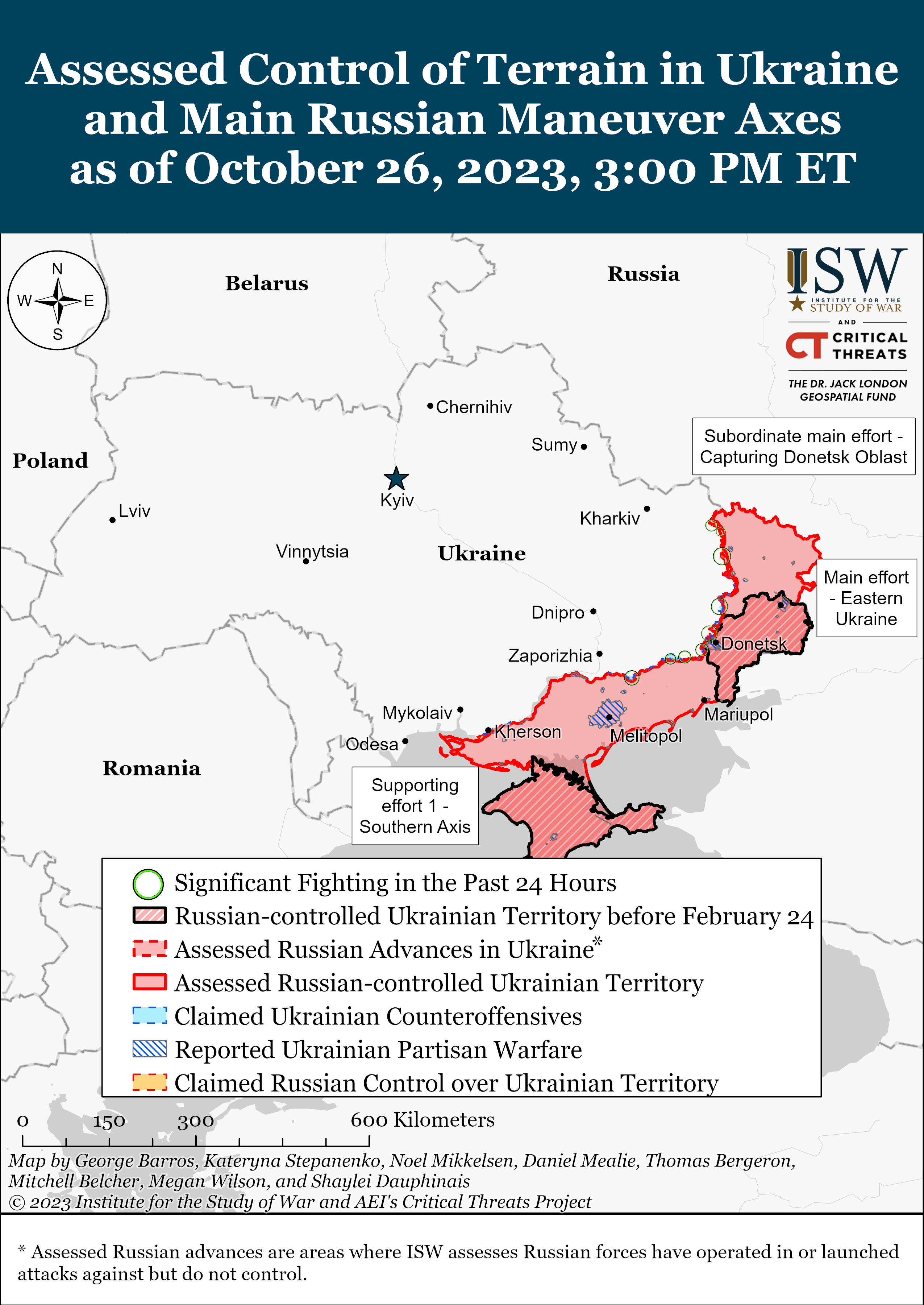
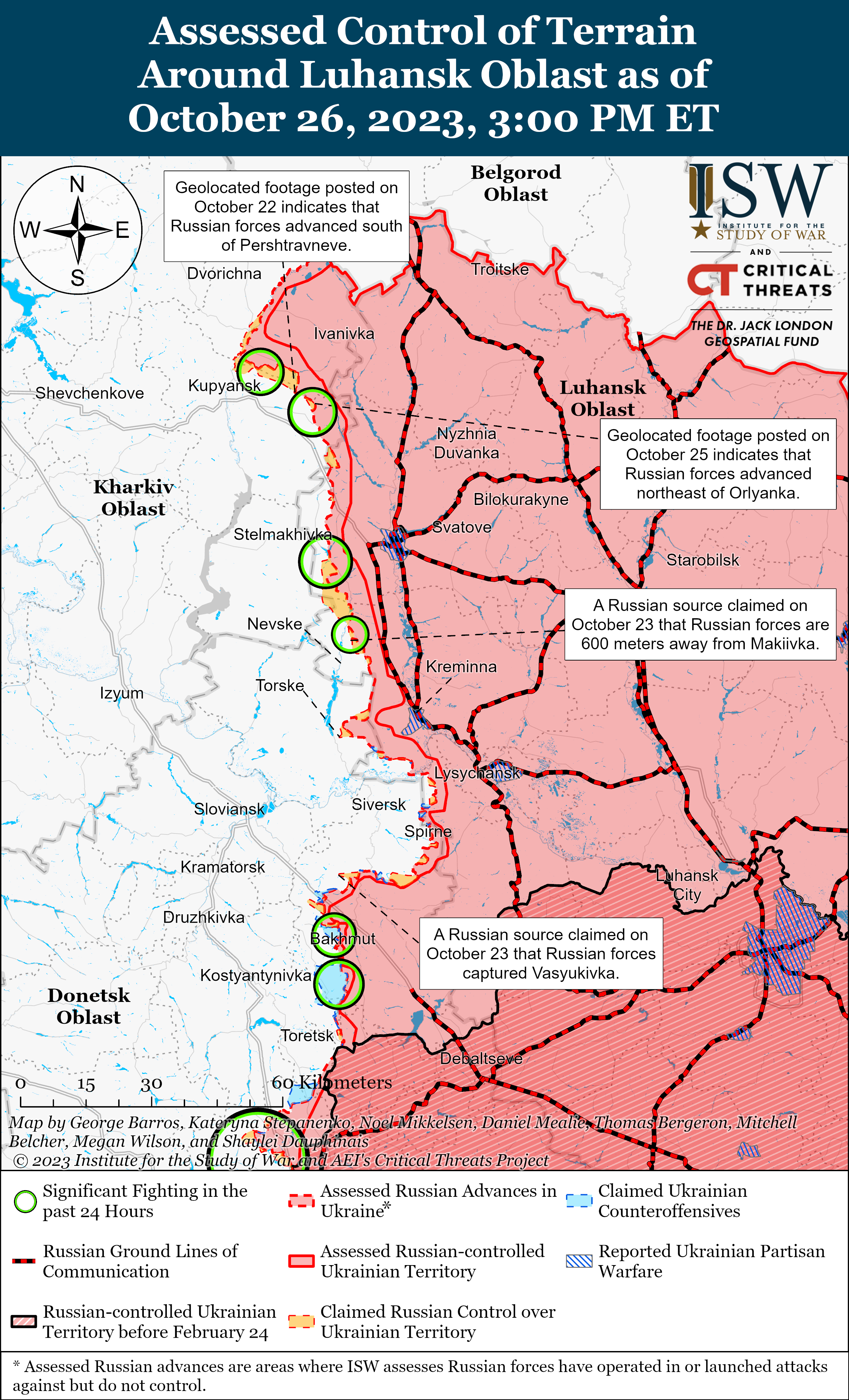
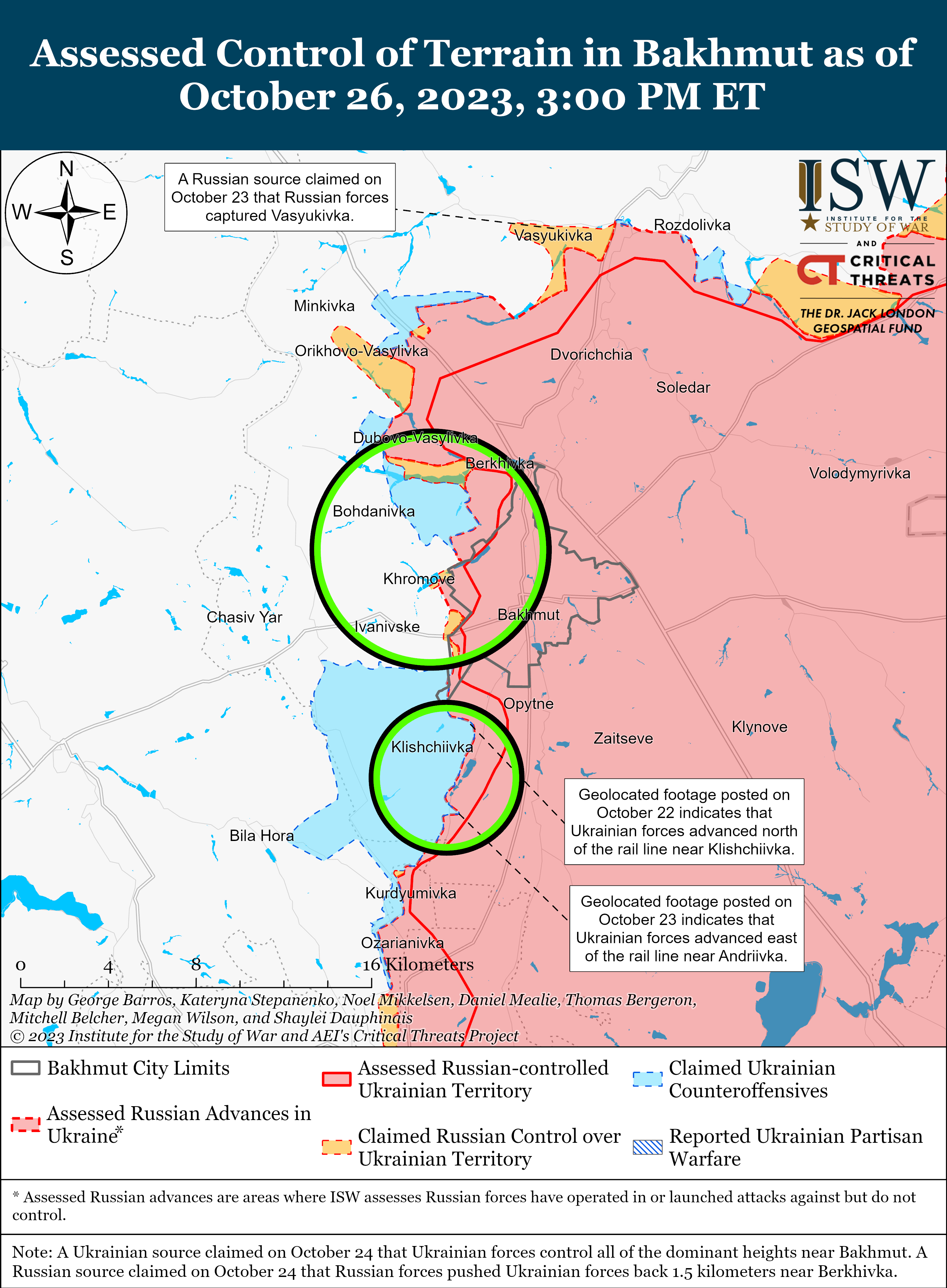
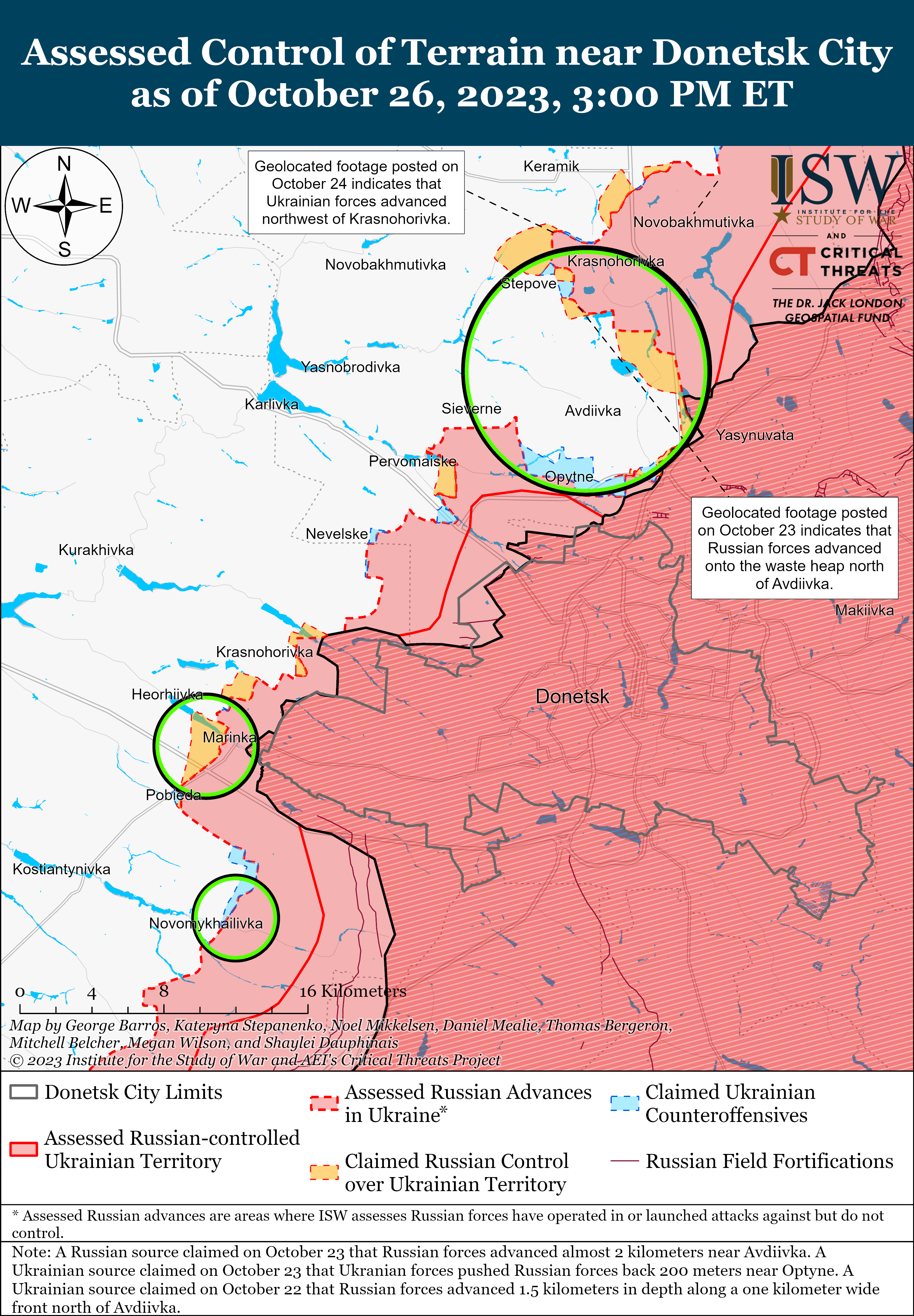
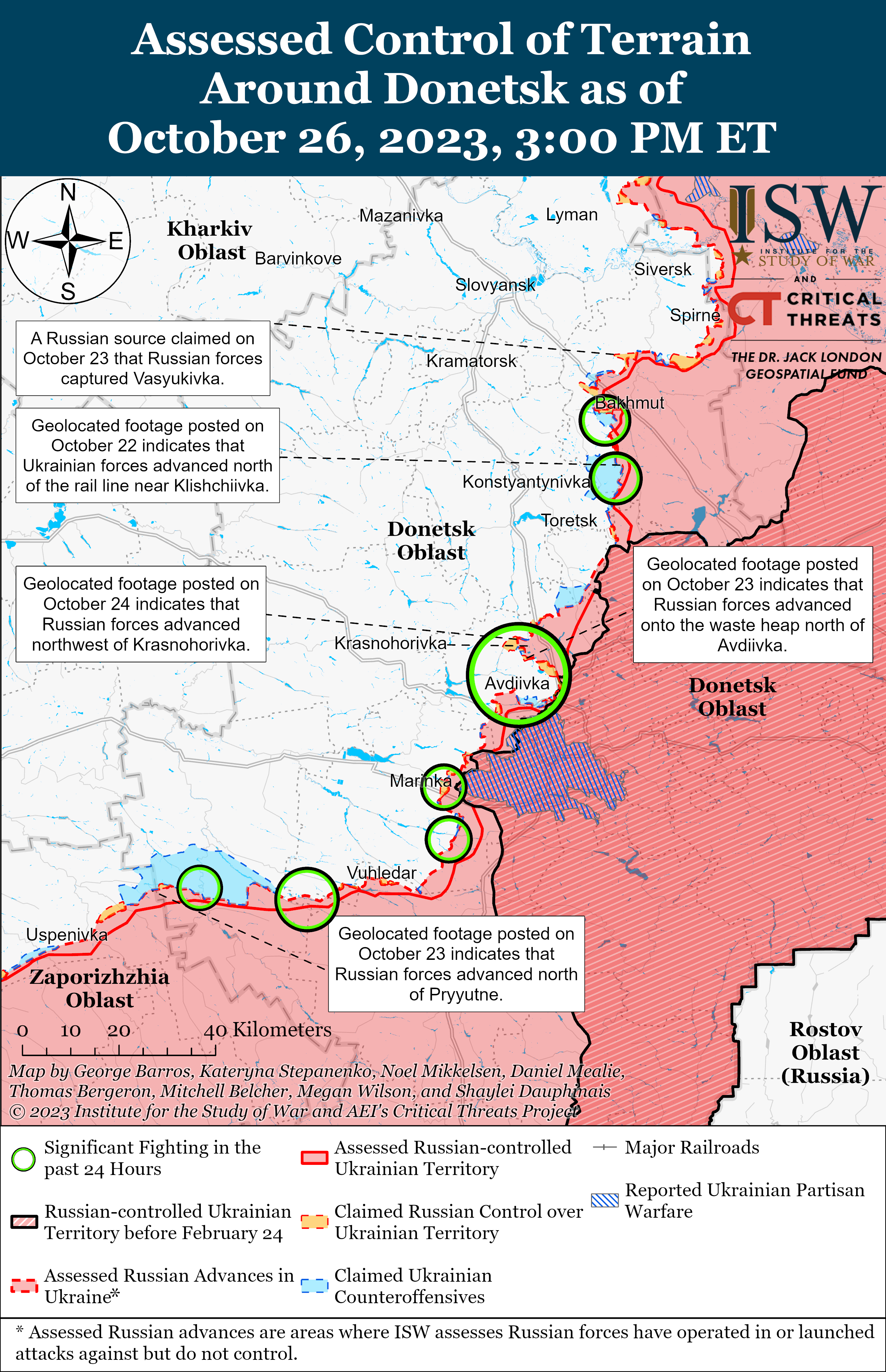
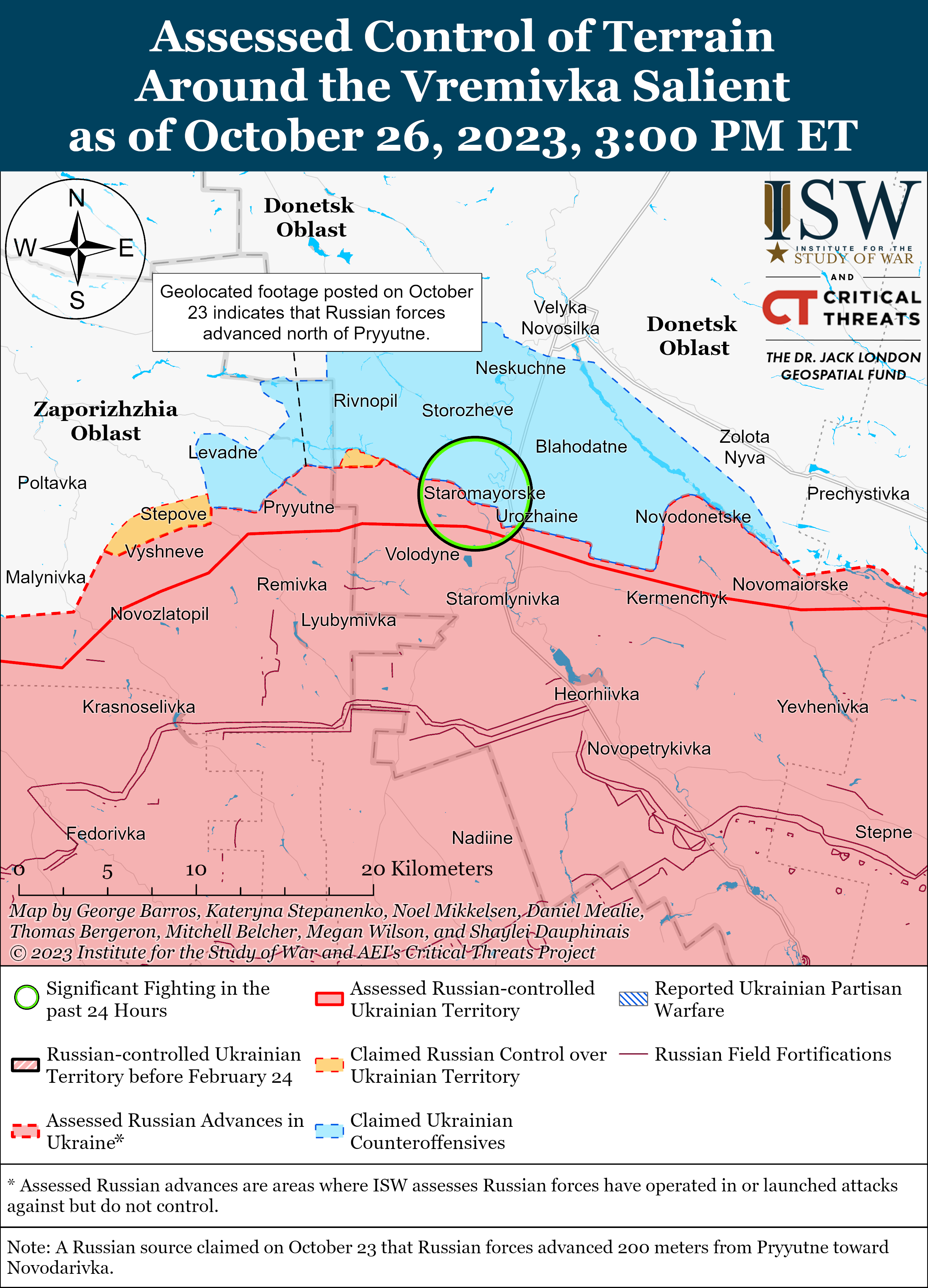
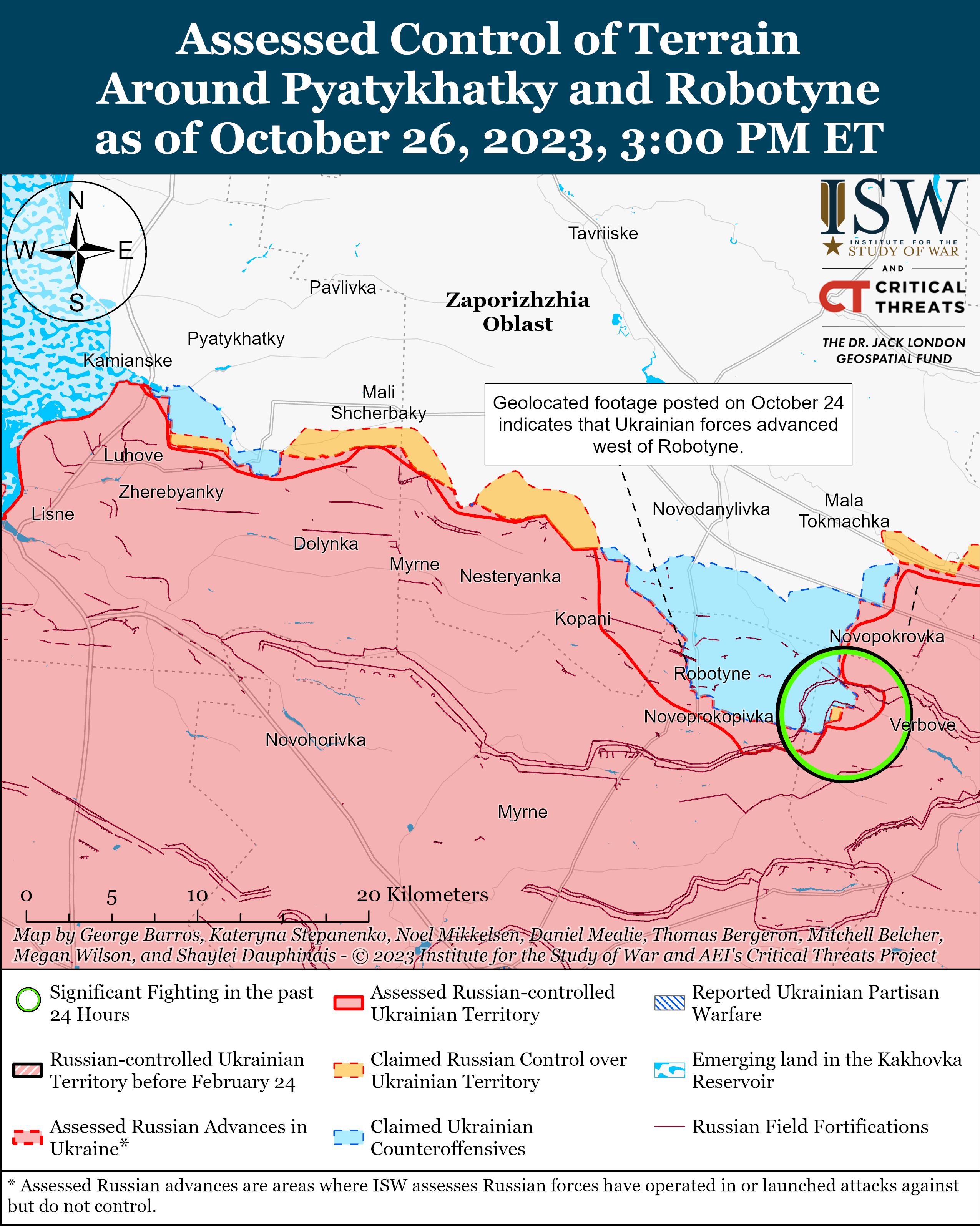
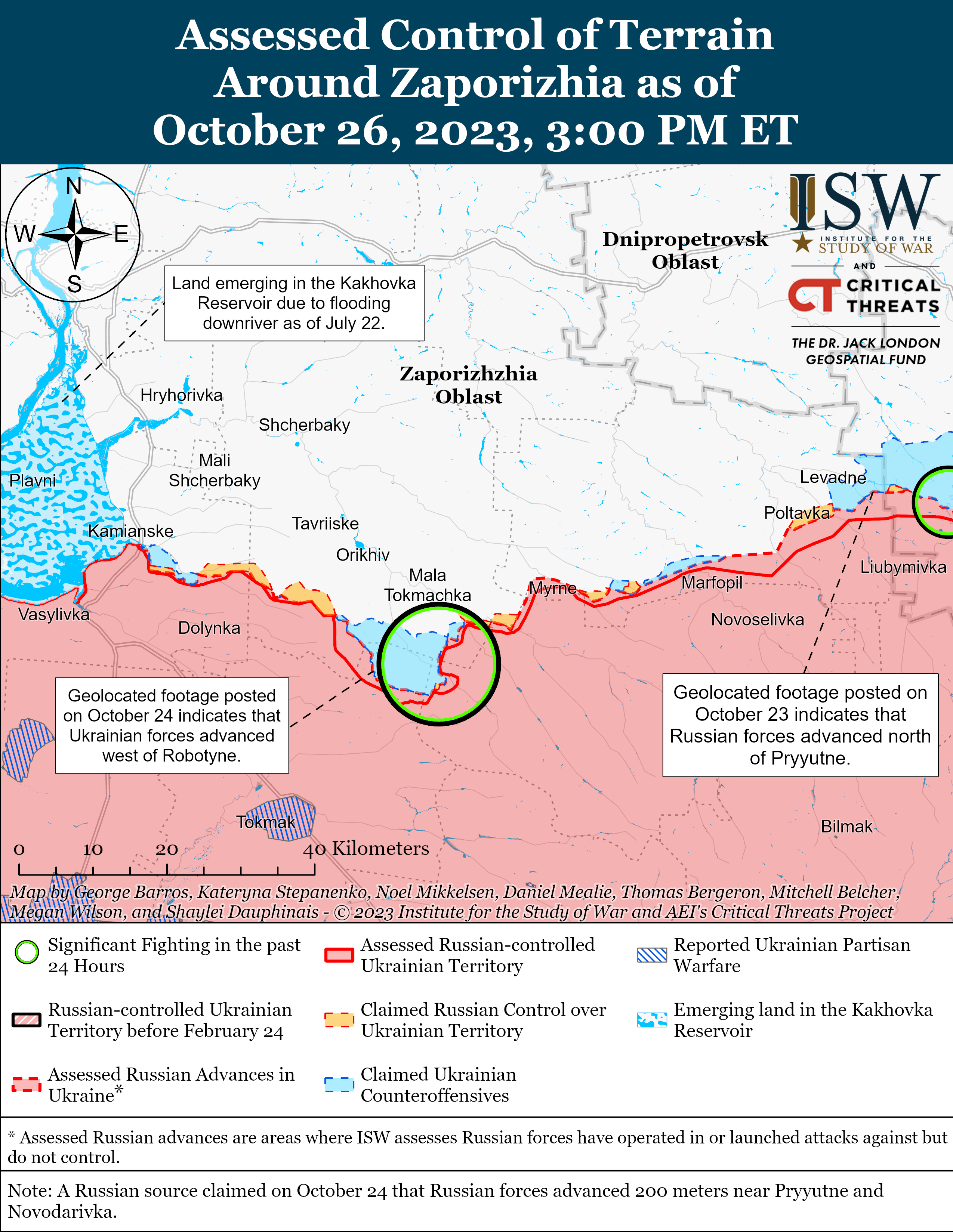
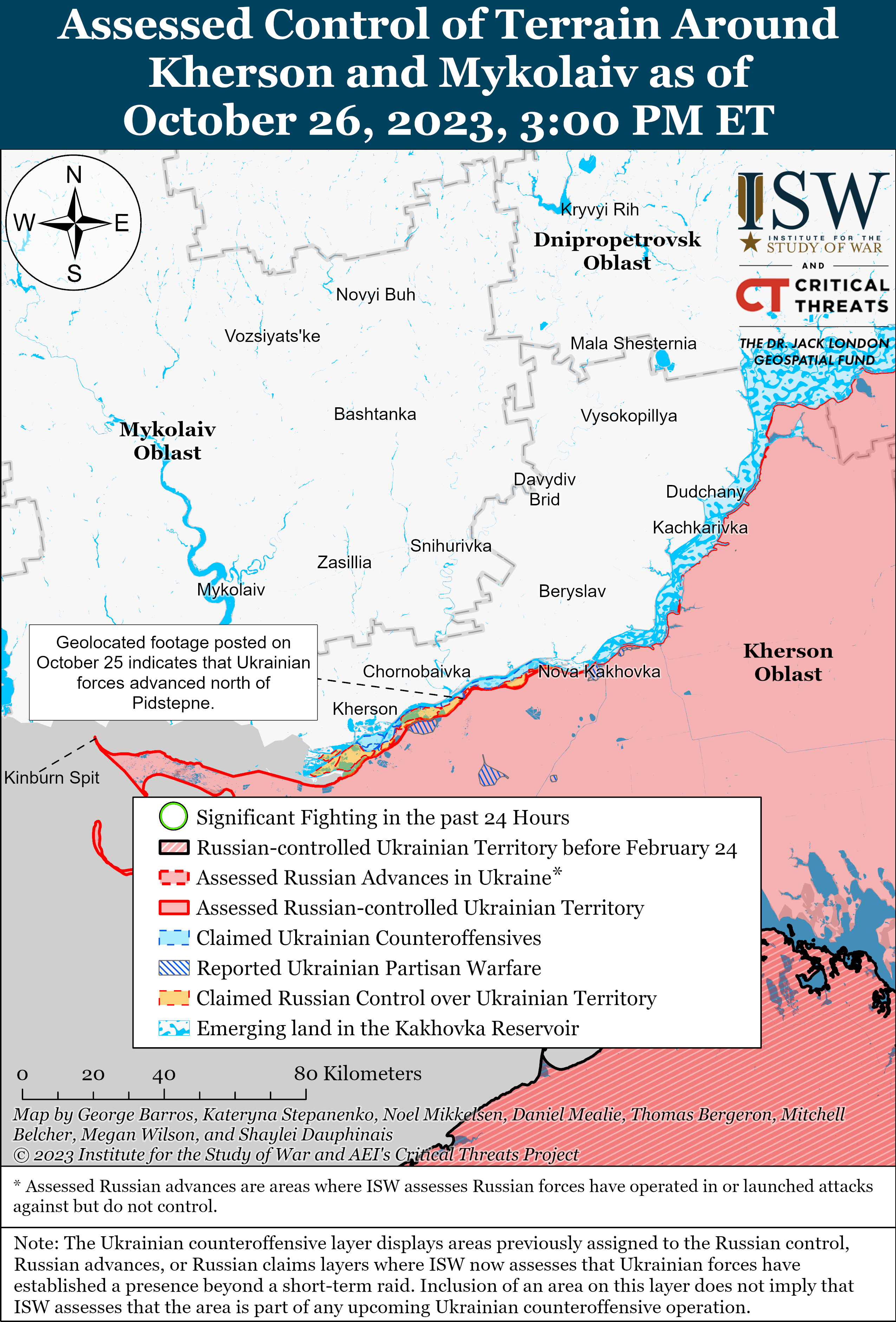
No comments:
Post a Comment